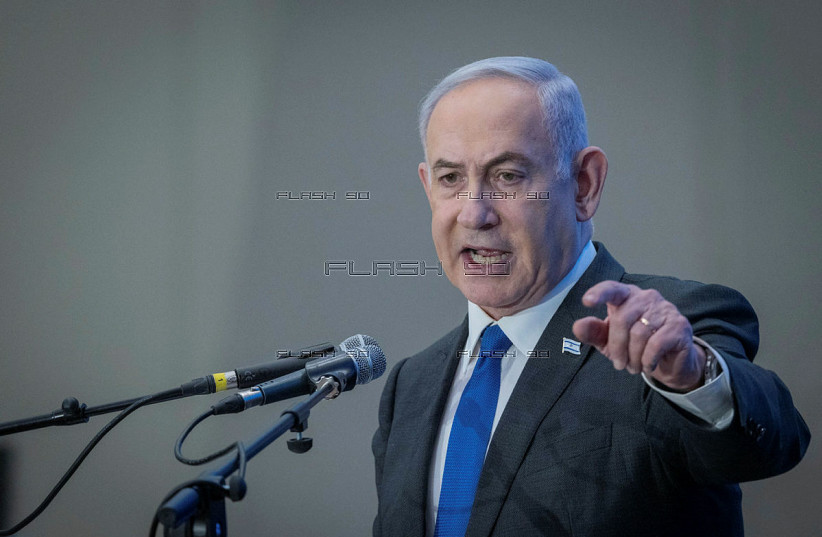Prime Minister Benjamin Netanyahu was forced on Monday to delay a symbolic Knesset vote affirming the government’s opposition to unilateral Palestinian statehood to allow time to shore up support for its passage.
The vote, initially scheduled for Monday night, had been designed to highlight Israeli unity on the issue. It fell prey, instead, to Right-wing politicians from the opposition who wanted Netanyahu to issue a stronger declaration against Palestinian statehood.
Netanyahu, on Monday, read out the government-approved declaration in the Knesset plenum in advance of a vote now scheduled for Wednesday.
He also issued a statement highlighting the importance of such a vote.
“In the last few days, we are witnessing a new type of pressure: an attempt to unilaterally impose on us the establishment of a Palestinian state that would endanger the existence of the State of Israel,” Netanyahu said.

“We reject it outright,” he stressed.
“Although there are different opinions within the government regarding a permanent arrangement [with the Palestinians], this proposal was unanimously accepted by all participants in the government.
“We are all united in the position that Israel must not submit to international dictates on such an existential matter,” he stressed.
He touted his record in opposing the kind of Palestinian statehood that would pose an existential threat to Israel.
“Even those who have different opinions agree that after October 7, we must make the decisions concerning our existence and our future ourselves – therefore, I call on all Zionist parties to vote in favor of the proposal,” he stressed.
But opponents of Palestinian statehood noted that while his language sounded as if he rejected unilateral Palestinian self-determination, it left the door open to accept it as part of a deal.
Liberman's, Lapid's comments
Yisrael Beytenu Party head MK Avigdor Liberman had attempted on Monday to push forward a counter-proposal by which the Knesset would vote against Palestinian statehood no matter the circumstances, but Netanyahu thwarted that initiative by moving his vote to Wednesday.
Liberman had charged in a post earlier on X Monday that the vote over Palestinian statehood was a “spin” connected to the United States initiative to normalize Israeli relations with Saudi Arabia in exchange for an agreement that included Palestinian statehood.
Netanyahu “opposed a unilateral decision but in parallel promised and pledged to the Saudis that within the framework of a deal, he would agree to the formation of a Palestinian state in one formulation or another,” Liberman charged.
The vote to affirm the government declaration was, therefore, actually to “form a Palestinian state within the framework of a deal with the Saudis,” and “as always, Netanyahu is trying to cheat everyone,” Liberman added.
Liberman has consistently criticized the government since the outbreak of the war, accusing it of being too dovish. His performance in the polls has nearly doubled his party’s current size, indicating that his message was being heard.
Ministers from Netanyahu’s Likud Party, as well as from the Religious Zionist Party (RZP) and Otzma Yehudit, also criticized the language, as it did not rule out a Palestinian state in general. However, it was Liberman’s opposition party – Yisrael Beytenu – whose criticism from the right caused Netanyahu to delay the vote.
Finance Minister and RZP chairman Bezalel Smotrich addressed the issue in a press conference ahead of his party’s weekly meeting on Monday and said that while his party opposed Palestinian statehood no matter the circumstances – the threat of the US unilaterally recognizing a Palestinian state was a “real diplomatic threat,” and therefore the government needed to use language that would garner broad consensus in the Knesset. Smotrich said that 100 out of 120 MKs supporting the declaration would be “significant” and added that there would always be “opposition from the left and from the right.”
Yesh Atid chairman MK Yair Lapid claimed on Sunday that Netanyahu was intentionally trying to bring the issue of Palestinian statehood to the center of public discourse to distract the public from his government’s intention to push ahead with its plan to lengthen military service while maintaining a sweeping exemption for Haredi men.
In an attempt to bring back the spotlight to the issue of Haredi service in the IDF, Lapid announced in a press conference ahead of his party’s weekly meeting on Monday that he has proposed a bill that “whoever draft-dodges shall not receive money.” Lapid also sent a letter to Defense Minister Yoav Gallant in which he wrote, “We cannot continue to fill the streets with slogans about ‘together we will win,’ if there is no ‘together we will enlist.’”
In Jerusalem on Sunday night, Netanyahu had announced his intention to have the Knesset affirm the government’s proclamation against unilateral Palestinian statehood.
In a speech to the Conference of Presidents, which is composed of American Jewish leaders, he explained that it would pass by an “overwhelming” majority.
The proclamation read: “Israel utterly rejects international diktats regarding a permanent settlement with the Palestinians. A settlement, if it is to be reached, will come about solely through direct negotiations between the parties, without preconditions.
“Israel will continue to oppose unilateral recognition of a Palestinian state. Such recognition in the wake of the October 7 massacre would be a massive and unprecedented reward to terrorism and would prevent any future peace settlement,” the proclamation stated.
Tovah Lazaroff contributed to this report.
